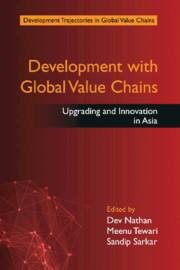Book contents
- Frontmatter
- Contents
- List of Tables and Figures
- 1 Introduction
- 2 The Changing Landscape of Contract Manufacturers in the Electronics Industry Global Value Chain
- 3 Gaining Process Rents in the Apparel Industry: Incremental Improvements in Labour and Other Management Practices
- 4 New Economic Geographies of Manufacturing in China
- 5 The Philippines: A Sequential Approach to Upgrading in Manufacturing Global Value Chains
- 6 Learning Sequences in Lower Tiers of India's Automotive Value Chain
- 7 Innovation and Learning of Latecomers: A Case Study of Chinese Telecom-Equipment Companies
- 8 From the Phased Manufacturing Programme to Frugal Engineering: Some Initial Propositions
- 9 Industrial Upgrading in the Apparel Value Chain: The Sri Lanka Experience
- 10 Strategic Change in Indian IT Majors: A Challenge
- 11 Moving from OEM to OBM? Upgrading of the Chinese Mobile Phone Industry
- 12 Indian Pharmaceutical Industry: Policy and Institutional Challenges of Moving from Manufacturing Generics to Drug Discovery
- 13 Revisiting the Miracle: South Korea's Industrial Upgrading from a Global Value Chain Perspective
- 14 Evolutionary Demand, Innovation and Development
- 15 GVCs and Development Policy: Vertically Specialized Industrialization
- Contributors
- Index
3 - Gaining Process Rents in the Apparel Industry: Incremental Improvements in Labour and Other Management Practices
Published online by Cambridge University Press: 01 November 2018
- Frontmatter
- Contents
- List of Tables and Figures
- 1 Introduction
- 2 The Changing Landscape of Contract Manufacturers in the Electronics Industry Global Value Chain
- 3 Gaining Process Rents in the Apparel Industry: Incremental Improvements in Labour and Other Management Practices
- 4 New Economic Geographies of Manufacturing in China
- 5 The Philippines: A Sequential Approach to Upgrading in Manufacturing Global Value Chains
- 6 Learning Sequences in Lower Tiers of India's Automotive Value Chain
- 7 Innovation and Learning of Latecomers: A Case Study of Chinese Telecom-Equipment Companies
- 8 From the Phased Manufacturing Programme to Frugal Engineering: Some Initial Propositions
- 9 Industrial Upgrading in the Apparel Value Chain: The Sri Lanka Experience
- 10 Strategic Change in Indian IT Majors: A Challenge
- 11 Moving from OEM to OBM? Upgrading of the Chinese Mobile Phone Industry
- 12 Indian Pharmaceutical Industry: Policy and Institutional Challenges of Moving from Manufacturing Generics to Drug Discovery
- 13 Revisiting the Miracle: South Korea's Industrial Upgrading from a Global Value Chain Perspective
- 14 Evolutionary Demand, Innovation and Development
- 15 GVCs and Development Policy: Vertically Specialized Industrialization
- Contributors
- Index
Summary
Introduction
Manufacturers in the apparel industry are not price-makers; rather, they are generally price-takers. Entry into the apparel manufacturing global value chain (GVC) segment is relatively easy because there is no requirement for complex technical knowledge, or for a large amount of capital. Apparel manufacture in GVCs is often a country's first entry into modern manufacturing. Thus, there is a high level of competition in the apparel manufacturing GVC segments, both at the national and international levels. This raises the question: is there any scope for apparel manufacturers to increase their returns despite taking prices as given? Obviously, this can happen only if they are able to cheapen the cost of production compared to their competitors, either by reducing the cost of inputs, mainly labour (often called the ‘low road’); or by increasing the efficiency of production (the ‘high road’). An improvement in the efficiency of production will require some investment, but the investment can pay off in terms of higher returns with respect to the overall investment made.
Increases in returns due to improvements in production processes are called process rents; they are returns on investments which are higher than those secured by competitors who do not carry out such incremental improvements. However, process improvements are easily copied and can spread throughout the industry. If that happens, we get the Prebish-Singer-Kaplinsky (Kaplinsky, 2005) result: the gains of productivity improvement will be captured by the buyers, the brands and big retailers, and not accrue to the producer firms. In order for some firms to secure process rents, the situation would need to be one where some firms undertake the process improvements, but this practice has not spread across the industry as a whole. This spreading of the process improvements would need to be considered not only on a national, but on a global scale, given that lead firms can, over time, switch the location of production.
These process improvements can be called process innovations. Even if they are not new to the industry as a whole, they represent a change or innovation in the functioning of supplier firms. The innovations dealt with fall into the category of incremental innovation. However, it is these incremental innovations that allow some manufacturers to increase their returns even while functioning under the same market conditions as other non-innovative firms.
- Type
- Chapter
- Information
- Development with Global Value ChainsUpgrading and Innovation in Asia, pp. 63 - 85Publisher: Cambridge University PressPrint publication year: 2019



